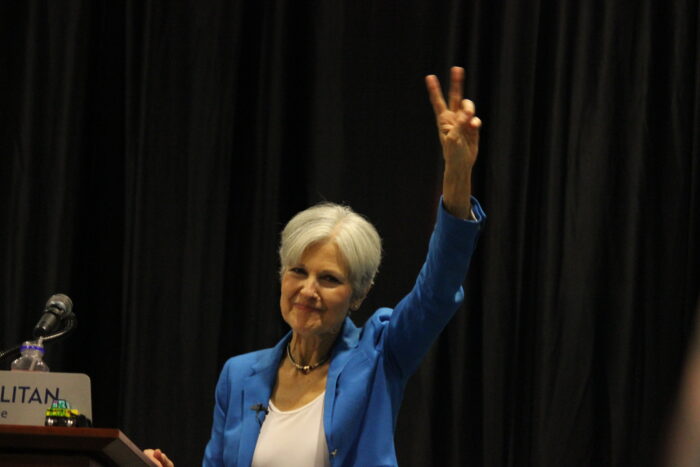In addition to Israel, « in her own way, she hates Arab populations, » said Donald Trump about Kamala Harris on September 10 during the debate between the Democratic and Republican candidates. The opponents were questioned on their policies toward Israel, specifically regarding the war in Gaza. The former president played the “both-and” card, positioning himself as a defender of both Israel, appealing to the 7.5 million-strong American Jewish community, and of Arab populations, this time targeting the 3.5 million Americans of Arab origin.
Voir cette publication sur Instagram
Will it work? Won’t it work? This questionable approach at least has the merit of highlighting the Middle Eastern puzzle for American policymakers. This raises another question: is the « Muslim Factor » real, and what impact could it have on the election of the next leader of the United States?
Does the « Muslim Factor » exist?
Traditionally, Arab American voters lean toward the Democratic Party. A survey conducted by the Council on American-Islamic Relations (CAIR) reveals that 69.1% of members of this community typically vote for the progressive party. However, Driss Alaoui Belghiti, an international relations expert at the Policy Center for the New South (PCNS), argues that this historic trend represents a vote « by » Muslims, rather than a « Muslim vote. » This distinction is significant, especially for the upcoming presidential election.
Driss Alaoui Belghiti adds that the Muslim electorate in the United States includes people from the Middle East, North Africa, and Pakistan, all « scattered throughout the United States. » Thus, describing this group as a homogeneous, politically aligned community may be premature… at least until recently. According to Driss Alaoui Belghiti, 2024 could mark the first election where the “Muslim vote” takes on particular importance. As he notes, « Gaza has imposed itself » on the American campaign. With the conflict spreading into Lebanon and threatening to ignite the entire region, the Muslim vote may play an increasingly significant role.
The example of Michigan is especially telling. At the end of February 2024, Joe Biden did indeed win an electoral victory in the state’s Democratic primaries, but without the support of the Muslim community. « About 80,000 people cast blank ballots, which was interpreted as a sign of the Muslim electorate’s distrust toward Joe Biden’s pro-Israel stance, » explains Driss Alaoui Belghiti.

« Genocide Joe, » as some disappointed Democrats have dubbed him due to his support for Israel, has a poor reputation among Muslim voters. According to a recent CAIR poll, 98.2% of them disapprove of the president’s handling of the Palestinian issue. The international relations expert has even noted a shift in the Muslim community’s vote toward Donald Trump. « But that is no longer the case today, » he warns. He concludes, « The Muslim vote is embryonic, localized, and needs to be developed. »
Will it swing?
Let us remember that in this election, American voters do not directly choose their president. They vote for « electors » — whose number is proportional to the population — who in turn select their preferred candidate. Except for Maine and Nevada, all states follow the « winner takes all » rule, meaning that the candidate who wins the majority receives all of the state’s electoral votes.
Certain swing states, which alternate between Democratic and Republican support from one election to the next, are at the center of candidates’ electoral strategies. Their voters are especially valued, as the entire state can shift with a margin of only a few thousand votes. This is where the « Muslim Factor » comes into play.
Driss Alaoui Belghiti identifies four key states where Muslims are numerous enough to sway the vote, starting with Michigan, where, as we’ve seen, Muslims have organized effectively as a voting community.
This state, which counted 206,000 Muslim voters in 2020, was won by Joe Biden “with only a 150,000-vote margin over Donald Trump,” explains Driss Alaoui Belghiti. As for the three other swing states where the Muslim community could tip the balance one way or the other, they are Georgia, Pennsylvania, and Wisconsin:
In these states where victory hangs by a thread, “a Muslim vote could make the difference,” says the international relations expert. But this will depend on their ability to organize before November 5.
The “Gaza vote”
And while, in the United States, “international affairs generally have little influence on Americans’ votes,” Driss Alaoui Belghiti notes, he believes that “this time, there could be a ‘Gaza vote’: certain decisive electorates might be swayed by the situation.” Besides Muslims, he observes that “Gen Z, students who have largely mobilized against the war,” may choose their candidate based on their Middle East policy.
One candidate has thus garnered significant support from a portion of American Muslims. Her name is Jill Stein. She belongs to neither the Democrats nor the Republicans. She is the Green Party’s champion, representing the environmentalist party.
Highly active in pro-Palestinian demonstrations, Jill Stein has repeatedly expressed her opposition to the current American policy of supplying weapons to Israel. In a recent post on X, she wrote: “Every vote for our campaign is a vote against genocide and endless war (…) Why aren’t we spending our money to uplift the people instead of massacring children?”
Every vote for our campaign is a vote against genocide and endless war. Every vote helps grow the movement for climate action, reparations, good schools, healthcare and housing as human rights. Why aren’t we spending our money to uplift the people instead of massacring children? pic.twitter.com/7e2E5o6Gh5
— Dr. Jill Stein🌻 (@DrJillStein) September 15, 2024
Since the conflict extended into Lebanon, Jill Stein’s voice has grown even stronger. « Let’s call Israel’s attack on Lebanon by its name: terrorism. We (the Green Party) call on the Biden-Harris administration to condemn these terrorist attacks and immediately halt arms deliveries to Netanyahu’s genocidal regime, » she declared on Instagram.
The Green candidate’s rhetoric is resonating with American Muslims. In a survey conducted at the end of August, the Council on American-Islamic Relations (CAIR) found her neck and neck with Kamala Harris within this community, each garnering about 29% support. Stein’s stance poses a challenge for Harris, who would take significant risks by making such statements.
« Abandon Harris ’24 »
« Winning over Muslim voters is therefore a real challenge for the Democrats, » agrees Driss Alaoui Belghiti. On the Republican side, he believes that Donald Trump has given up on this demographic and does not count on these voters.
For while some Arab countries are « friendly » with the Republican candidate, within U.S. borders, Arab Americans remember the « anti-immigration » decree, labeled « anti-Muslim. » This order, issued by the former president in 2017, aimed to « totally and completely » ban Muslims (from identified countries) from entering the United States. It was repealed by Joe Biden.

Thus, « these votes are not compatible with Trump, but they might also refrain from voting for the Democrats, potentially tipping the election in favor of the Republican candidate, » analyzes Driss Alaoui Belghiti. This is precisely the risk posed by campaigns like the one led by Hassan Abdel Salam: « Abandon Harris ’24. » Abdel Salam, who initiated the « Abandon Biden ’24 » movement, has now extended it to the vice president for similar reasons. « Kamala Harris has been clear about her commitment to continue supporting the State of Israel, » he explains. Hassan Abdel Salam has stated that his movement will support Jill Stein in the upcoming election.
Other voices in the Muslim community are calling for assurances from Kamala Harris. While she has declared that America will no longer turn a blind eye to the suffering of the Palestinian people, she has yet to outline any plan to pressure Benjamin Netanyahu for a ceasefire, either in Gaza or in Lebanon. Thaer Ahmad, a Palestinian doctor, told the New York Times that a mere change in tone would not be enough to convince him. Osama Siblani, publisher of Arab American News, similarly asserts that a Muslim vote for Kamala Harris will « not be automatic. »
Whether feeling threatened by such a movement, which has gained traction in nine swing states according to its founder, or simply wanting to secure her advantage, Kamala Harris has intensified her outreach to the Muslim community in the United States. On October 4, she met with Muslim representatives on the sidelines of a conference in Michigan. On October 2, her national security advisor, Phil Gordon, held discussions with Arab and Muslim leaders about the war, expressing « concern for civilians in Lebanon. » Tim Walz, Harris’s running mate, appeared on October 3 at a virtual event titled « One Million Muslim Votes: A Path Forward, » where he called for an end to this « stunning and devastating » war.
Will this be enough to counter the enthusiasm generated by Jill Stein, whose candidacy could siphon off many votes from American Muslims?
The importance of strategic voting
To offer an answer to this question, Driss Alaoui Belghiti points to a reality that polls struggle to capture: the voter who changes their mind at the ballot box. “Those who say they won’t vote Democrat because the party supports the Israeli campaign may reconsider on voting day. This is likely what Joe Biden was counting on before he stepped aside,” he explains.
What the international relations expert describes is the dilemma of strategic voting. Since her first campaign in 2012, Jill Stein has never garnered more than 1% of the vote. Certainly, the disappointment Joe Biden caused among his Muslim voters was so pronounced that “the Green Party candidate clearly posed a threat to him,” observes Driss Alaoui Belghiti. But now that Kamala Harris has replaced her former running mate, he believes Jill Stein is less of a danger for the Democrats.
After all, American Muslims traditionally vote for the Democratic Party. “At the end of the day,” with their backs against the wall, they may turn to a Kamala Harris who is “more nuanced” on the Palestinian issue and whose domestic agenda appeals to them, rather than risking a Donald Trump who, not so long ago, said that Israelis should “quickly finish what they started.”
Written in French by Marin Daiel Thézard, edited in English by Eric Nielson



